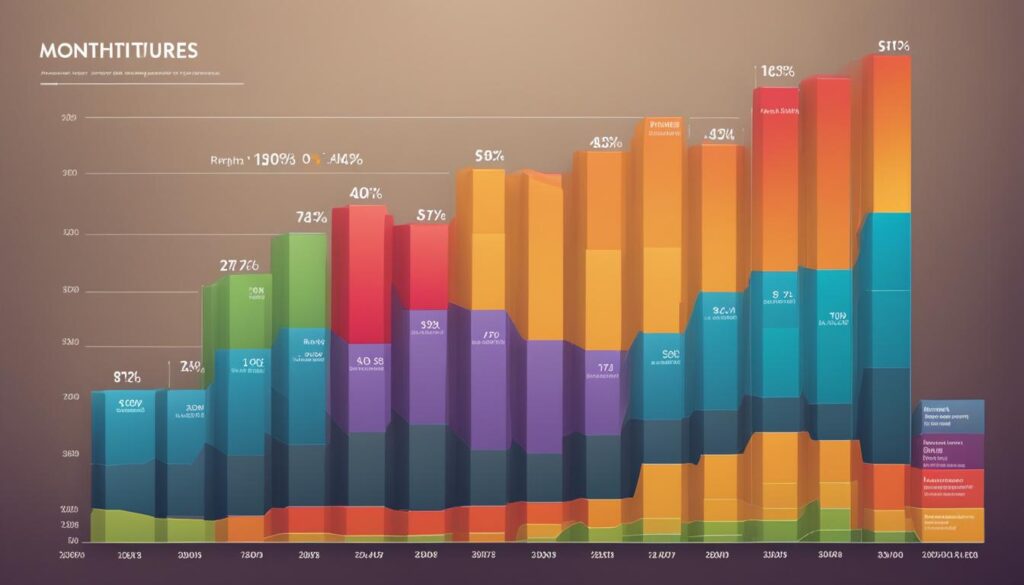Budgeting is an essential aspect of personal finance that can have a profound impact on your financial health and overall happiness. While many people associate budgeting with restriction and sacrifice, it actually provides the freedom to prioritize and allocate your money towards things that bring you joy.
Numerous studies have shown that there is a correlation between money and happiness up to a certain point, but beyond that, the key lies in how you utilize your financial resources. By creating a budget and being intentional with your spending, you can achieve a sense of control over your finances, reduce stress, and unlock the potential for financial happiness.
Key Takeaways:
- Budgeting allows you to prioritize and allocate your money towards things that bring you joy.
- Creating a budget helps you gain control over your finances and reduce stress.
- Studies show that money and happiness are correlated up to a certain point, but how you use your financial resources matters more.
- A budget helps you make intentional spending decisions and align them with your personal values and goals.
- Budgeting is not about restriction and sacrifice, but about finding financial freedom and happiness.
The Impact of Budgeting on Happiness
Budgeting prompts individuals to evaluate their spending decisions and consider how each expense contributes to their overall happiness. While certain expenses, such as rent or utility bills, may be considered necessities, it is important to view every item through a happiness prism. For example, living in a smaller home may allow for more money to be allocated towards travel or other experiences, which can bring greater joy. It is crucial to assess whether an expense genuinely contributes to your happiness and aligns with your personal values and goals. By identifying areas where you can cut back on less meaningful expenses, you can redirect funds towards activities, experiences, or purchases that truly bring you pleasure.
“Budgeting prompts individuals to evaluate their spending decisions and consider how each expense contributes to their overall happiness.”
“Living in a smaller home may allow for more money to be allocated towards travel or other experiences, which can bring greater joy.”
By analyzing spending decisions and prioritizing meaningful expenses, individuals can maximize their happiness and satisfaction with their financial choices.
“By identifying areas where you can cut back on less meaningful expenses, you can redirect funds towards activities, experiences, or purchases that truly bring you pleasure.”
Table:
| Expense Category | Meaningfulness |
|---|---|
| Monthly subscription services | Low |
| Quality time with loved ones | High |
| Healthy food and fitness expenses | Medium |
| Impulse purchases | Low |
The Health Benefits of Budgeting
Budgeting not only impacts financial well-being but also has a significant influence on various aspects of an individual’s health. Research has shown that budgeting can help reduce the physical symptoms of stress, such as muscle tension and elevated blood pressure, by providing a sense of control and reassurance. Furthermore, budgeting can support a healthy immune system by alleviating stress and allowing the body to function optimally. By budgeting for healthcare expenses, such as checkups, preventive care, and therapy sessions, individuals can maintain their well-being and prioritize their health. Additionally, budgeting can prevent individuals from overextending themselves financially and emotionally, reducing the risk of burnout and promoting a healthier lifestyle.
The Connection Between Budgeting and Stress Reduction
“Having a budget in place can greatly reduce stress levels. When you have a clear understanding of where your money is going and how it is being allocated, you can feel more in control of your financial situation. This sense of control provides reassurance and alleviates anxiety, leading to a reduction in stress levels.”
A study conducted by the University of California, Los Angeles (UCLA) found that individuals who budgeted their income experienced lower levels of stress compared to those who did not. The researchers attributed this to the fact that budgeting provides structure and certainty, reducing financial uncertainty and worry. This, in turn, positively affects emotional well-being and overall quality of life.
The Impact on Healthcare Funding and Emotional Well-being
| Benefits of Budgeting for Healthcare | |
|---|---|
| 1 | Budgeting allows individuals to set aside money specifically for healthcare expenses, ensuring that they are able to afford necessary medical care and preventive measures. |
| 2 | Having a budget for healthcare funding reduces financial stress and the need to resort to unhealthy coping mechanisms, such as avoiding necessary medical checkups or delaying treatments. |
| 3 | By prioritizing healthcare in the budget, individuals can proactively address their physical and mental health, leading to improved overall well-being and emotional stability. |
In conclusion, budgeting not only provides financial stability and freedom, but it also has a positive impact on an individual’s health. By reducing stress, supporting a healthy immune system, and enabling individuals to prioritize healthcare funding, budgeting contributes to emotional well-being and promotes a healthier lifestyle. Incorporating budgeting as a regular practice can have long-term benefits for both financial and physical health, ultimately leading to greater overall happiness and well-being. So, start budgeting today and reap the health benefits along the way.
Getting Started with a Budget
Creating and sticking to a budget can be a powerful tool for managing finances and enhancing happiness. By adopting an effective and goal-oriented approach, individuals can gain control over their financial situation. Here are some steps to get started:
Step 1: Assess Your Current Financial Situation
Before creating a budget, it’s important to assess your current financial situation. This includes calculating your income, listing your expenses, and identifying any outstanding debts. By having a clear understanding of your financial picture, you can make more informed decisions when creating your budget.
Step 2: Set Clear Financial Goals
Having clear financial goals is essential to creating a goal-oriented budget. Take some time to think about your short-term and long-term financial objectives. Whether it’s paying off debt, saving for a down payment on a house, or planning for retirement, setting specific and achievable goals will help guide your budgeting decisions.
Step 3: Allocate Funds towards Priorities
Once you have a clear understanding of your financial situation and goals, it’s time to allocate your funds towards your priorities. The 50-20-30 rule can be a helpful framework. Allocate 50% of your income towards essentials, such as rent, groceries, and bills. Save 20% for your financial goals, such as savings or debt repayment. Lastly, use the remaining 30% for discretionary expenses, such as entertainment and dining out.
However, keep in mind that this rule is just a guideline, and you should adjust it based on your individual circumstances and priorities.
Step 4: Regularly Review and Adjust Your Budget
Remember that budgeting is an ongoing process. It’s important to regularly review and adjust your budget as needed. Life circumstances change, and your financial goals may evolve over time. By staying flexible and adapting your budget accordingly, you can ensure it remains effective and aligned with your current needs and aspirations.
Consider seeking guidance from a financial planner or money coach who can provide personalized advice and help you stay on track with your budgeting goals.

Creating and sticking to a budget is a journey that requires commitment and discipline. However, with the right approach and a goal-oriented mindset, budgeting can serve as a powerful tool to take control of your finances and enhance your overall happiness.
Investing in Your Happiness
Budgeting not only helps with financial well-being but also allows individuals to align their spending with their personal values, ultimately leading to greater happiness. By consciously allocating resources towards activities, experiences, and purchases that bring joy, individuals can build a life that reflects their desired lifestyle and priorities.
“Money can’t buy happiness, but it can buy experiences and things that contribute to our overall well-being,” says Dr. Jane Simmons, a leading psychologist.
When we spend our money in alignment with our personal values and what brings us genuine happiness, we’re more likely to experience long-term satisfaction and fulfillment.
Research has shown that spending money in line with one’s personality and preferences can significantly improve happiness levels. For introverted individuals, this may mean investing in solitary activities or hobbies that provide a sense of tranquility and personal growth. Extroverted individuals, on the other hand, may find happiness in social experiences and networking opportunities. By understanding one’s own preferences and incorporating them into the budget, individuals can make deliberate spending choices that enhance their overall well-being.
| Aligning Spending with Personal Values | Examples |
|---|---|
| Health and Wellness | Investing in gym memberships, organic food, and wellness retreats. |
| Education and Growth | Enrolling in courses, attending conferences, or purchasing books. |
| Travel and Exploration | Planning trips to new destinations or immersing in different cultures. |
| Family and Relationships | Allocating resources for quality time, memorable experiences, and meaningful gifts for loved ones. |
By aligning spending with personal values, individuals can prioritize what truly matters to them and avoid wasteful consumption that does not contribute to their happiness. This intentional approach to budgeting empowers individuals to make mindful financial decisions and create a life that brings them genuine joy and fulfillment.

The Importance of Flexibility in Budgeting
A key aspect of successful budgeting is flexibility. While having a budget is important for financial control and well-being, it is equally important to allow for adjustments and adaptions as circumstances change. A rigid budget can lead to feelings of shame or failure if unrealistic goals are not met. Flexibility enables individuals to account for unexpected expenses, seasonal variations, and changing priorities.
Regular recalibration and reviewing of the budget ensure that it aligns with current needs and goals. By embracing flexibility, individuals can reduce financial stress and enhance their overall sense of control and well-being.
As life unfolds, unforeseen events and expenses can arise. Having the flexibility to reallocate funds from one category to another can help individuals stay on track and avoid financial setbacks. Whether it’s a medical emergency, a home repair, or an opportunity to invest in self-development, a flexible budget allows for the necessary adjustments without compromising financial stability.
Flexibility in budgeting also fosters a positive relationship with money. It encourages a sense of adaptability and resourcefulness, as individuals learn to navigate unexpected circumstances and make informed decisions about their finances. The ability to recalibrate the budget when needed demonstrates a proactive approach to managing money and can lead to a greater sense of financial empowerment.
The Benefits of a Flexible Budget
- Reduces financial stress by accommodating unexpected expenses
- Allows for adjustments based on changing priorities and goals
- Encourages resourcefulness and adaptability in managing finances
- Builds a positive relationship with money and promotes financial empowerment
Tips for Implementing a Flexible Budget
- Set aside a portion of the budget for unexpected expenses
- Regularly review and update the budget to reflect current needs and priorities
- Be open to making adjustments and reallocating funds as necessary
- Seek guidance from a financial advisor or coach to help navigate changes and optimize the budget
| Benefits of Flexibility in Budgeting | How It Helps |
|---|---|
| Reduces financial stress | Accommodates unexpected expenses and prevents financial setbacks |
| Promotes financial empowerment | Allows individuals to make informed decisions and adapt to changing circumstances |
| Encourages resourcefulness | Requires individuals to think creatively and find solutions within their budget |
Conclusion
In conclusion, budgeting is a powerful tool that can enhance both financial well-being and happiness. By creating a budget and making intentional financial decisions, individuals can gain a sense of control over their money and reduce stress. Additionally, budgeting allows for the allocation of funds towards experiences and purchases that bring genuine joy and align with personal values.
Not only does budgeting provide the freedom to prioritize and align spending, but it also supports overall health, both physically and emotionally. Research has shown that budgeting can reduce the physical symptoms of stress and promote a healthier lifestyle. By budgeting for healthcare expenses and avoiding financial overextension, individuals can prioritize their well-being and achieve a greater sense of peace.
With an effective and flexible budget, individuals can build a life that reflects their aspirations and unlock the key to lasting happiness. By aligning financial decisions with personal values and goals, budgeting allows for a meaningful use of financial resources. Ultimately, budgeting enables individuals to enhance their financial well-being, pursue their passions, and create a life that brings them true happiness.
FAQ
What is budgeting?
Budgeting is the process of planning and allocating your money to different categories, such as expenses, savings, and wants, in order to effectively manage your finances and achieve your financial goals.
How does budgeting impact happiness?
Budgeting allows individuals to prioritize and allocate their money towards things that bring them joy, aligning their spending with their personal values and goals. By being intentional with their financial decisions, individuals can achieve a sense of control over their finances, reduce stress, and unlock the potential for financial happiness.
Can budgeting improve my health?
Yes, budgeting can have significant health benefits. It helps reduce stress, which in turn can alleviate physical symptoms related to stress, such as muscle tension and elevated blood pressure. By budgeting for healthcare expenses, individuals can also prioritize their well-being and maintain a healthy lifestyle.
How do I get started with a budget?
There are various approaches to getting started with a budget. One effective method is the 50-20-30 rule, which divides your income into essentials, savings, and wants. Another approach is zero-sum budgeting, where every dollar is allocated to specific expenses, savings, or debt repayment. It is important to tailor the budget to your individual circumstances and regularly recalibrate it to reflect changing needs and goals.
How can I align my spending with my personal values?
To align your spending with your personal values, it is important to identify what truly brings you joy and allocate your resources accordingly. Consider your preferences, personality, and goals when creating a budget. Investing in experiences, hobbies, and activities that enhance your well-being can be a valuable use of your financial resources and contribute to long-term happiness.
Is flexibility important in budgeting?
Yes, flexibility is crucial in budgeting. It allows you to account for unexpected expenses, seasonal variations, and changing priorities. Embracing flexibility reduces financial stress and enhances your overall sense of control and well-being. Regularly reviewing and recalibrating your budget ensures it aligns with your current needs and goals.
Can Budgeting Help in Managing Healthcare Expenses and Improve Happiness?
Budgeting for healthcare costs can indeed help in managing expenses and improve overall happiness. By allocating a specific amount for medical expenses, individuals can have a clear understanding of their financial capabilities. This allows for more efficient decision-making and reduces the stress associated with unexpected healthcare costs. Effective budgeting ensures that necessary medical expenses are covered without compromising other aspects of life, promoting a sense of security and well-being.
Source Links
- https://www.healthday.com/mental-health-information-25/psychology-and-mental-health-news-566/can-a-budget-make-you-happier-747561.html
- https://www.nbcnews.com/better/business/what-happiness-budget-why-you-should-adopt-one-ncna880331
- https://www.everydayhealth.com/emotional-health/why-making-a-budget-can-be-good-for-your-health/

